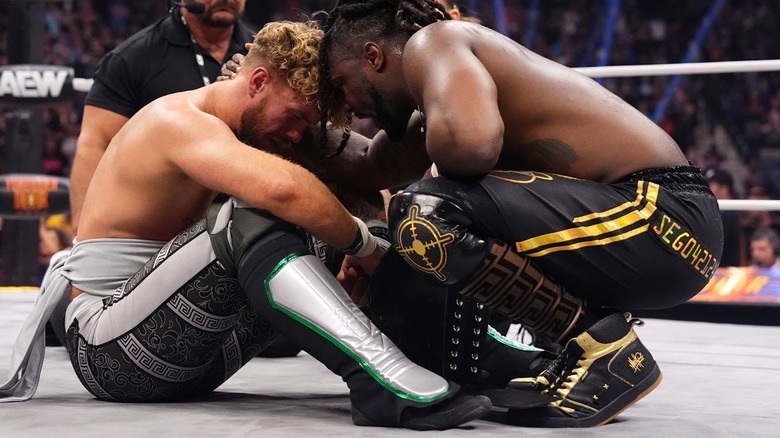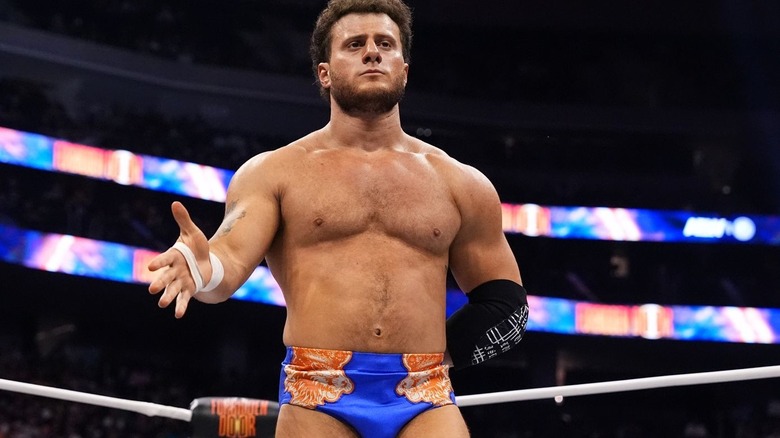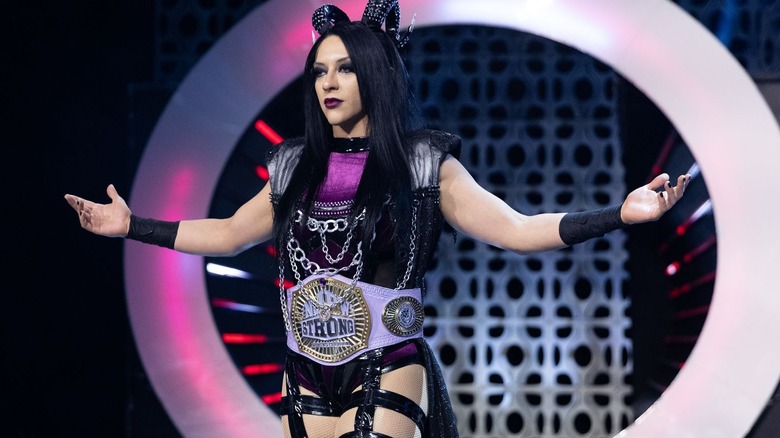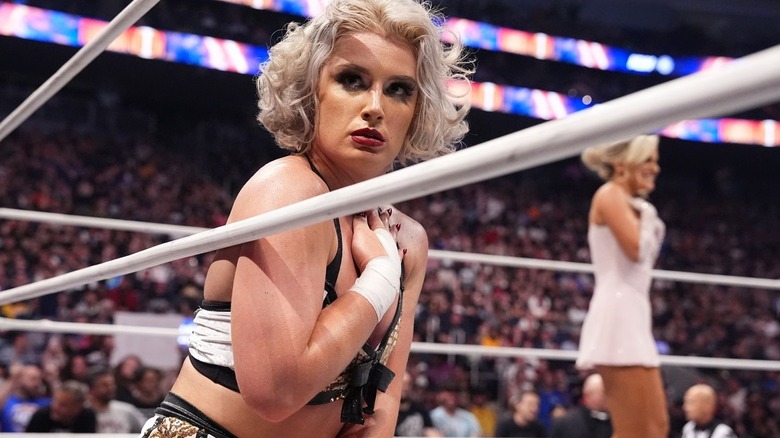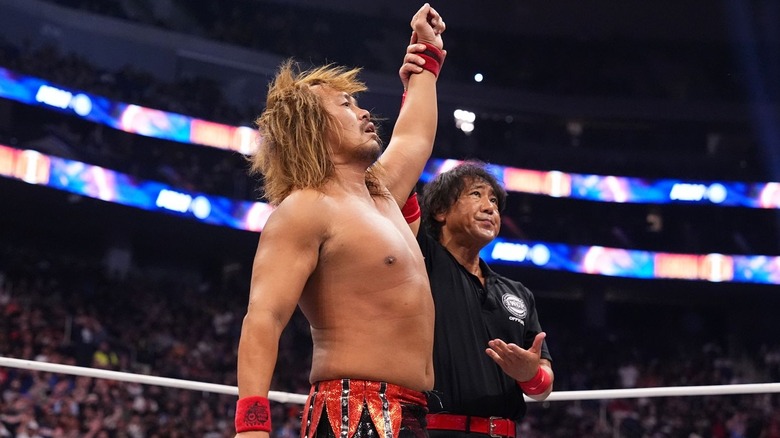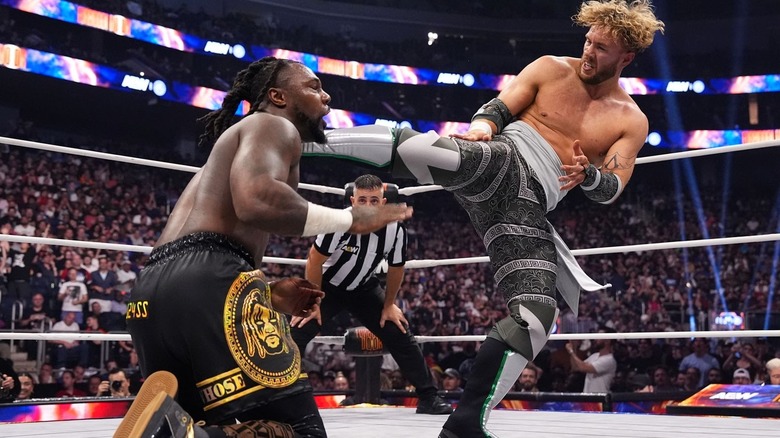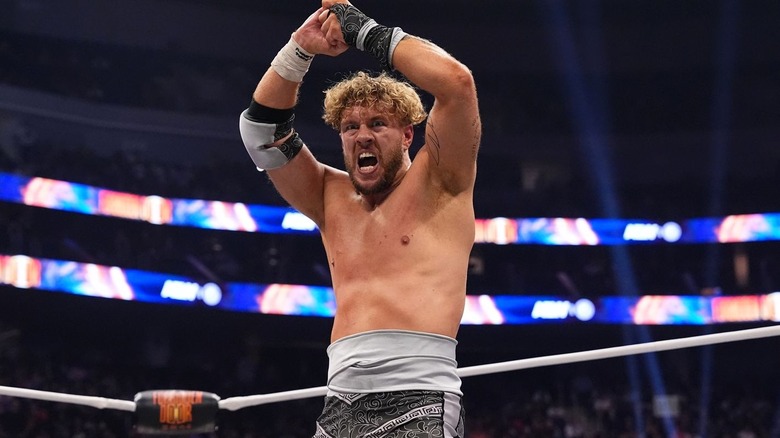AEW X NJPW Forbidden Door 2024: 3 Things We Hated And 3 Things We Loved
Welcome to Wrestling Inc.'s annual review of AEW x NJPW Forbidden Door, and for once we actually don't feel weird saying that, because it has now officially been a year since we started doing these columns, and Forbidden Door is now the first PPV that we've loved and hated twice in a row! Now yes, last year we did five things we hated and five things we loved, because we were still trying to cover every single thing that happened on every show, or close to it. These days, we cut ourselves a little more slack, leaving the comprehensive thoroughness to things like our Forbidden Door results page while focusing on what made us feel the very best feelings, or the very worst ones.
With that in mind, we may not be able to talk about matches like Zack Sabre Jr. vs. Orange Cassidy or The Elite vs. "Scissor Ace," but we have plenty of hot takes fresh and ready to be served up about the things that we cared about the most. Here are three things we hated and three things we loved about AEW x NJPW Forbidden Door 2024.
Hated: MJF phones it in and kills the crowd
AEW x NJPW Forbidden Door had a lot of matches that could've worked as an opener. There were ladder matches, trios matches, fast matches, exciting matches, matches with Mistico in them, matches with Willow Nightingale in them — the show was brimming with contests that could've worked as a proper opening to the program. And yet, the promotion decided to foist a heatless match between MJF and Hechicero on the Long Island crowd, setting an odd tone that never really recovered for the rest of the night.
MJF and Hechicero had a solid match that would've fit on Rampage or Collision, but as a PPV opener it was woefully wrong. Sluggish, lacking any kind of drama, the glorified squash match overstayed its welcome and wore out the immense energy the hometown crowd had for the former AEW World Champion. MJF's entire deal since his return from injury has been heatless, sauceless, juiceless — you pick the adjective, it's bad. Will Ospreay, Swerve Strickland, Daniel Garcia, The Elite, the soon-to-return "Hangman" Adam Page; so many other people feel like a focal point, while MJF is getting lost in the background. Narratively, it makes sense to give him a struggle, an obstacle to overcome, and "possible obsolescence" is definitely an obstacle for a young wrestler. It just happened to leave us with a match that was dull as dishwater and led to a weird crowd energy that held back numerous matches.
Written by Ross Berman
Loved: Stephanie Vaquer is HER
The match between Stephanie Vaquer and Mercedes Mone for the TBS and NJPW Strong Openweight titles made for this writer's favorite of the night by far. In a bout more than worthy of the main event, CMLL wound up boasting the MVP of the night in Vaquer as she won over the indifferent Long Island crowd in attendance; albeit with a little help from their ire towards the Boston native. Mone wound up working the underdog role in the match, telling a story of countering Vaquer's power with her superior speed and making for a unique blend of styles.
By the end of the bout, though it may have been quite predictable that she would win, Mercedes Mone was visibly rattled by her opponent and the crowd turning against her. She had retained her title but the match was more of a testament to her durability, surviving the bout more than anything else. Considering Forbidden Door is supposed to highlight the pool of talent within NJPW, STARDOM, and CMLL, this match was befitting the label as it brought to light one of the best talent on the planet right now. A great title defense in the bag for Mercedes Mone, and another dream match on the horizon with that Britt Baker tease. That really could have been the main event.
Written by Max Everett
Hated: The AEW Women's World Championship match gives me the ick
On Sunday's Forbidden Door event, AEW Women's World Champion "Timeless" Toni Storm took on Mina Shirakawa in a high-profile title defense. In a match-up between two incredibly capable wrestlers, a wild card was introduced in the form of a ringside Mariah May. The match went on as expected, with Storm retaining, and in the last 24 hours of pride month, AEW set the gay community back at least 10 years.
That may be an exaggeration, but the gross fetishization of sapphic romance is not only disturbing and unethical, but was also incredibly lazy. As Storm retained her title, May was forced to choose between her "mother" (we're not going to get into the incestuous, Oedipus-complex undertones of that) and her lover from her STARDOM days. The logical solution was not to walk away, pick one over the other, or even just hug it out. No, the logical conclusion was to have May pressure Storm and Shirakawa into a three-way kiss.
A love triangle like this has not been seen since the days of "Twilight" and "The Hunger Games" — that is to say, generating so much attention while simultaneously offering so little substance. The whole storyline is noncommittal in its queer "representation" (I struggle to use that word, given how shallow the romantic connections between the three women are). During the match, the commentary team explicitly referred to Shirakawa as May's "friend," and other platonic titles were assigned to May's relationship between the two women. It's rather clear that there was never any intention of a fully-fleshed out commitment to a lesbian romance, which leads the educated viewer to believe that the skinship between Storm, May, and Shirakawa was impersonal, with no true romantic feelings attached. Impersonal connections between queer people are fine, but it felt like AEW wanted to have three women kiss while distancing themselves from a possibly queer storyline (despite Anthony Bowens' famous "I'm gay" promo, having multiple members of the queer community on their roster, etc.). The distinct use of lesbian skinship in order to generate attention and, consequently, profit through exposure and revenue is crude and, frankly, insensitive entertainment meant to generate a cheap pop. It is near-pornographic in its absurdity and exploitativeness.
Say the objectification of queer romance is not an issue for you. That's fine — this segment was still awful. There is a startling lack of depth in the ending. Shirakawa and Storm just went to war, and there are deeply personal ties to May associated with the outcome of this match. There is all the reason for more bad blood, but instead of portraying the bitterness of loss in a productive way (or, honestly, even just settling for a normal sign of respect, like a handshake), they decided to have Shirakawa and Storm — who just finished beating each other up — kiss in the middle of the ring and act like everything is okay. All of the inner turmoil that this storyline arguably had was flushed with one poorly-planned move that was meaninglessly manufactured to create cheap noise. It's 2024. Wrestling is so competitive, and the standards are so high. Is this not beneath us, as people who paid for this show (or, at least, people who risked viruses on their computer to watch this show)?
The way AEW has handled the May/Shirakawa/Storm conundrum has been nothing short of embarrassing, and all-around disappointing. The unapologetic queerbaiting took away from any in-ring credibility that match had — and that is a practical death sentence for AEW, who prides itself on having better matches than the competition. If it's gay storylines and gay wrestlers AEW is after, then they have them in abundance in the likes of Bowens and Nyla Rose — though sadly no loner in the form of Sonny Kiss. There have been whole divisions and promotions dedicated to queer wrestling, so it's not like AEW does not have a plethora of new talent to pull if they are seriously committed to bringing a diverse roster to millions of screens all over the world. Instead, they choose to waste their stars and their resources into generating obscene and, frankly, pointless moments that will get some views on social media, but are more likely to be scorned into obscurity.
There is no way to defend this segment. Either you denounce and disavow it for its shallow and greedy portrayal of real identities, or you disregard it for its lack of sense. For a world title-level storyline, it was disgustingly boring. This should give you the ick.
Written by Angeline Phu
Loved: Naito is back where he belongs
Tetsuya Naito is once again the top dog in New Japan Pro-Wrestling. The wily veteran represents a semblance of stability for NJPW in a year where guys like Kazuchika Okada left and freelancers like Jon Moxley carried the title. Moxley has been a respectful champion, and also a fighting champion, flying to Japan for title defenses — though he still draws fans' and wrestlers' ire for not appearing on the smaller shows. Moxley's time as champion was never meant to be long. He's an odd fit, and so heavily involved in AEW programming that it's hard to really see him as the face of any other company. The belt is finally back where it belongs.
From a storytelling perspective, NJPW's many young upstarts finally have a target they can chase on every single show, after months of complaining that the world champion was elsewhere. Heading into the G1 Climax, having the world champion in the tournament means that losses will lead to future title matches and the kaleidoscopic dance of NJPW booking can continue with -for lack of a better term- the belle of the ball, and Naito always plays that role with gusto. The match might not have reached the beautifully violent heights of Moxley and Naito's Windy City Riot match, but the result is a breath of fresh air for NJPW programming, which has been rudderless without that shiny gold belt to drive stories.
Written by Ross Berman
Loved: Champion vs. Champion lived up to the billing
Will Ospreay put his undefeated streak on the line for the AEW World Championship against Swerve Strickland in an insanely action-packed and seemingly never ending battle. Normally there would be issues with a match doing what Ospreay vs. Swerve accomplished, and to be fair in the wider scope of things AEW could dial it back, but this was the right occasion for both competitors to go all out. Both had something to prove to themselves, one another, and the fans with this match. Ospreay has been on a tear since first stepping foot in AEW, beating the likes of Kenny Omega and Orange Cassidy before he'd even signed with the promotion. And Strickland had found himself somewhat overshadowed by the "Aerial Assassin" even as World Champion.
The match had everything it could possibly muster, finisher spamming, near-falls a plenty, a referee bump, a screwdriver? Yeah that bit was admittedly weird. But the rest of it was insane, pro wrestling junk food that has — for better or for worse — become a staple within AEW. Ospreay is now fallible heading into his International title defense against Daniel Garcia this coming Wednesday, and Swerve Strickland has truly affirmed himself atop AEW as World Champion. It was the right match, the right result, and at the right time with Wembley just around the corner.
Written by Max Everett
Hated: Tastes great, less filling
Minutes after Swerve Strickland vs. Will Ospreay ended, I immediately began seeing chatter about it being a Match of the Year candidate, and I just really need everybody to pump the brakes on that. I know they did a lot of stuff that looked cool, which is all some people seem to want out of wrestling, but I will be shocked if this match makes a preponderance of MOTY ballots in December. My excellent colleague Max Everett said it himself in praise of this match — it was junk food. The short-term high of a sugar rush, sure, but you'll be hungry again in an hour.
There were a few things that didn't work for me about Swerve/Ospreay, but the main one is that when it got to the finish, it couldn't decide what it wanted to be. At first it wanted to be about whether Ospreay would use the Tiger Driver '91, which he's been conflicted about since his match with Bryan Danielson, but there didn't end up being much there; Swerve countered it, but Ospreay clearly tried to hit it, so he must have gotten over his emotional conflict somehow (how he did this is not clear). Then the match pivoted to being about Don Callis and Ospreay's relationship with the Family, and I guess whether or not he's going to become a violent psychopath, because this guy who's super conflicted about using a legal wrestling move on his in-ring opponent is now apparently considering stabbing a ringside manager to death with a screwdriver because he shoved the leader of the stable Ospreay is barely seen associating with. But the Don Callis thing couldn't be the finish either; instead, the last part of the match moved jerkily into "multiple finishers can't keep a guy down until one of them finally does" trope territory. Any of these concepts for finishes could have worked well individually, but shoving them all in at once just made the match feel like it couldn't decide on a direction. That lack of narrative cohesion is why we're not going to remember this match in six months.
Beyond that ... I'm sorry, but Will Ospreay did not need to be protected from a single loss so badly that there was a ref bump, he got a visual pin on Swerve, then he got distracted by Callis and Prince Nana and the screwdriver, and then he kicked out of a million finishers and it took a million and one to keep him down. Again, you're just doing too much, and I don't understand this thing wrestling fans do now where they think a match is inherently better if everybody is incredibly well-protected during the finish. That gives you the quick fix of "wow he kicked out of another finisher," but it also tends to screw with match flow and pacing, flattening things out and making spots that should stand out in your memory get lost in a haze of false finish dopamine.
AEW is out here pretending wrestling is a serious sport to be taken seriously like the other sports, but they can't even tell a story where the second-best wrestler loses to the best wrestler because he's the best — the primary narrative of actual sports. Allowing wrestlers, particularly a top babyface, to lose after giving it their all because they just got beat by a better wrestler allows them to deepen their characters; it allows the audience to see how they respond to failure, which tells you who they are. Protecting a top babyface to this degree just tells us they need the storyteller's help to look good because they don't actually have what it takes.
Written by Miles Schneiderman
